- Clone
- DTA-1 (See other available formats)
- Regulatory Status
- RUO
- Other Names
- Glucocorticoid-induced TNFR -related gene, TNFRSF18
- Isotype
- Rat IgG2b, κ
- Ave. Rating
- Submit a Review
- Product Citations
- publications
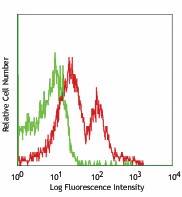
-

C57BL/6 mouse splenocytes stained with biotinylated DTA-1, followed by Sav-PE
| Cat # | Size | Price | Quantity Check Availability | Save | ||
|---|---|---|---|---|---|---|
| 126305 | 50 µg | 118€ | ||||
GITR (glucocorticoid-induced TNFR-related gene) is a member of the TNF receptor superfamily, also known as TNFRSF18 and AITR (in humans). It is expressed at low levels on resting T lymphocytes and at high levels on CD25+ CD4+ Tregs. The expression of GITR on T cells can be upregulated upon activation. Interaction of GITR with its ligand (GITRL) has been demonstrated to augment T cell activation, proliferation, cytokine production as well as MAPKs and NF-κB activation, and abrogate the inhibitory function of CD25+ CD4+ Tregs. In vivo activation of GITR causes development of autoimmune diseases and restores the suppressed immune response.
Product DetailsProduct Details
- Verified Reactivity
- Mouse
- Antibody Type
- Monoclonal
- Host Species
- Rat
- Immunogen
- Mouse CD25+ CD4+ T cells
- Formulation
- Phosphate-buffered solution, pH 7.2, containing 0.09% sodium azide.
- Preparation
- The antibody was purified by affinity chromatography, and conjugated with biotin under optimal conditions.
- Concentration
- 0.5 mg/mL
- Storage & Handling
- The antibody solution should be stored undiluted between 2°C and 8°C. Do not freeze.
- Application
-
FC - Quality tested
- Recommended Usage
-
Each lot of this antibody is quality control tested by immunofluorescent staining with flow cytometric analysis. For flow cytometric staining, the suggested use of this reagent is ≤ 0.25 µg per 106 cells in 100 µl volume. It is recommended that the reagent be titrated for optimal performance for each application.
-
Application References
(PubMed link indicates BioLegend citation) -
- De Luca A, et al. 2007. J. Immunol. 179:5999. PubMed
- RRID
-
AB_2203981 (BioLegend Cat. No. 126305)
Antigen Details
- Structure
- 66-70 kD homodimer of TNFR superfamily member.
- Distribution
-
Low levels on resting T cells, B cells, and macrophages; high levels on CD25+ CD4+ Tregs and CD25+ CD4+ CD8- thymocytes.
- Function
- Stimulation of GITR can abrogate or reduce the inhibitory function of CD25+ CD4+ Treg cells. In vivo activation of GITR may lead to the development of autoimmune diseases.
- Ligand/Receptor
- GITR ligand (GITRL).
- Cell Type
- B cells, Macrophages, T cells, Thymocytes, Tregs
- Biology Area
- Costimulatory Molecules, Immunology
- Molecular Family
- Adhesion Molecules, CD Molecules
- Antigen References
-
1. Tone M, et al. 2003. Proc. Natl. Acad. Sci. USA 100:15059.
2. Shimizu J, et al. 2002 Nat. Immunol. 3:135.
3. Stephens GL, et al. 2004. J. Immunol. 173:5008.
4. McHugh RS, et al. 2002. Immunity 16:311. - Regulation
- Activation of T and B cells can upregulate GITR expression.
- Gene ID
- 21936 View all products for this Gene ID
- UniProt
- View information about CD357 on UniProt.org
Related FAQs
- How many biotin molecules are per antibody structure?
- We don't routinely measure the number of biotins with our antibody products but the number of biotin molecules range from 3-6 molecules per antibody.
Other Formats
View All CD357 Reagents Request Custom Conjugation| Description | Clone | Applications |
|---|---|---|
| Biotin anti-mouse CD357 (GITR) | DTA-1 | FC |
| FITC anti-mouse GITR | DTA-1 | FC |
| PE anti-mouse CD357 (GITR) | DTA-1 | FC |
| APC anti-mouse CD357 (GITR) | DTA-1 | FC |
| PerCP/Cyanine5.5 anti-mouse CD357 (GITR) | DTA-1 | FC |
| PE/Cyanine7 anti-mouse CD357 (GITR) | DTA-1 | FC |
| TotalSeq™-A0193 anti-mouse CD357 (GITR) | DTA-1 | PG |
| Ultra-LEAF™ Purified anti-mouse CD357 (GITR) | DTA-1 | FC,IP,FA |
| TotalSeq™-C0193 anti-mouse CD357 (GITR) | DTA-1 | PG |
| TotalSeq™-B0193 anti-mouse CD357 (GITR) | DTA-1 | PG |
| Brilliant Violet 421™ anti-mouse CD357 (GITR) | DTA-1 | FC |
| Brilliant Violet 711™ anti-mouse CD357 (GITR) | DTA-1 | FC |
Compare Data Across All Formats
This data display is provided for general comparisons between formats.
Your actual data may vary due to variations in samples, target cells, instruments and their settings, staining conditions, and other factors.
If you need assistance with selecting the best format contact our expert technical support team.
-
Biotin anti-mouse CD357 (GITR)
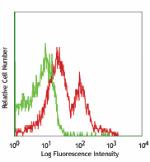
C57BL/6 mouse splenocytes stained with biotinylated DTA-1, f... -
FITC anti-mouse GITR
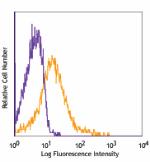
C57BL/6 splenocytes were stained with DTA-1 FITC. -
PE anti-mouse CD357 (GITR)
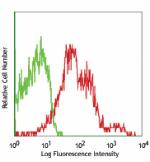
BALB/c mouse splenocytes stained with DTA-1 PE -
APC anti-mouse CD357 (GITR)
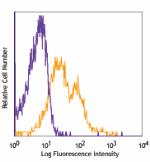
C57BL/6 splenocytes stained with DTA-1 APC -
PerCP/Cyanine5.5 anti-mouse CD357 (GITR)
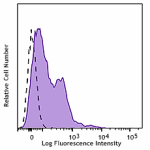
C57BL/6 mouse splenocytes were stained with CD357 (Clone DTA... -
PE/Cyanine7 anti-mouse CD357 (GITR)
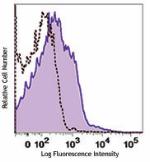
C57BL/6 mouse splenocytes were stained with CD357 (clone DTA... -
TotalSeq™-A0193 anti-mouse CD357 (GITR)
-
Ultra-LEAF™ Purified anti-mouse CD357 (GITR)
-
TotalSeq™-C0193 anti-mouse CD357 (GITR)
-
TotalSeq™-B0193 anti-mouse CD357 (GITR)
-
Brilliant Violet 421™ anti-mouse CD357 (GITR)

C57 mouse splenocytes were stained with anti-mouse CD25 APC ... -
Brilliant Violet 711™ anti-mouse CD357 (GITR)

C57BL/6 mouse splenocytes were stained with anti-mouse CD25 ...
 Login / Register
Login / Register 










Follow Us